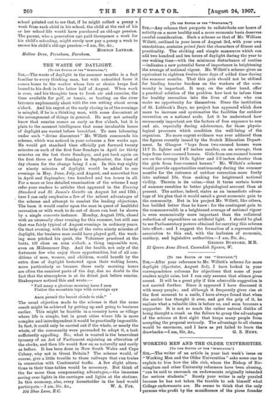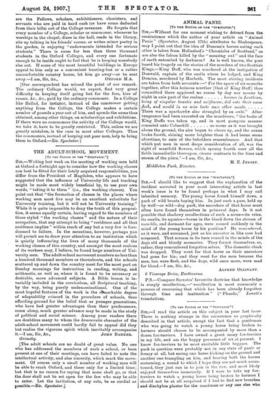WORKING MEN AND THE OLDER UNIVERSITIES.
[TO THE EDITOR OP TUB " SPEOTATOR."1
Sin,—The writer of an article in your last week's issue on " Working Men and the Older Universities " asks some one to explain to him how the idle rich, whom the Bishop of Bir- mingham and other University reformers have been abusing, "can be said to encroach on endowments originally intended for serious students." Surely your writer is only puzzled because he has not taken the trouble to ask himself what College endowments are. He seems to think that the only persons who profit by the munificence of the pious founder are the Fellows, scholars, exhibitioners, choristers, and servants who are paid in hard cash (or have sums deducted from their bills) out of the College revenues. He forgets that every member of a College, scholar or commoner, whenever he worships in the chapel, dines in the hall, reads in the library, sits up talking in his friends' rooms, or writes minor poetry in the garden, is enjoying "endowments intended for serious students." There is room for less than three thousand students in the Oxford Colleges, and every one fortunate enough to be inside ought to feel that he is keeping somebody else out. If some of the most beautiful buildings in Europe appeal to him only as a convenient hunting-box or a rather uncomfortable country house, let him go away—or be sent [Our correspondent has missed the point of our remark. The ordinary College would, we expect, find very great difficulty in keeping itself going but for the fees, hire of rooms, &c., (!tc., paid by the ordinary commoner. In a College like Balliul, for instance, instead of the commoner getting anything from the College, the College makes a certain number of pounds a year out of him, and spends the sums thus obtained, among other things, on scholarships and exhibitions. If there were no commoners the activity of the College would, we take it, have to be greatly restricted. This, unless we are greatly mistaken, is the case in most other Colleges. Thus the commoners, instead of keeping out poor men, help to bring them to Oxford.—ED. Spectator.]



































 Previous page
Previous page